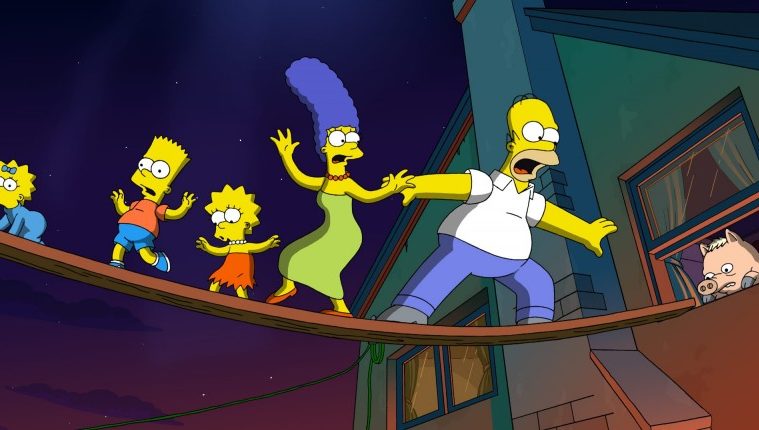
Looking back on this still-young century makes clear that 2007 was a major time for cinematic happenings — and, on the basis of this retrospective, one we’re not quite through with ten years on. One’s mind might quickly flash to a few big titles that will be represented, but it is the plurality of both festival and theatrical premieres that truly surprises: late works from old masters, debuts from filmmakers who’ve since become some of our most-respected artists, and mid-career turning points that didn’t necessarily announce themselves as such at the time. Join us as an assembled team, many of whom were coming of age that year, takes on their favorites.
I was born in June of 1992, a year particularly important to Simpsons lore. On one hand, my date of birth fell three months before the airing of the show’s fourth season, which is considered by many a fan to be a creative peak. And five months before I came into this world, President George H.W. Bush remarked, during a speech at the Annual Convention of the National Religious Broadcasters, that the American family needs to be “a lot more like the Waltons and a lot less like the Simpsons.” In retrospect, it’s funny to think that Homer’s dysfunctional crew were considered a particular offense to old-fashioned American values, even if I, admittedly, wasn’t alive at the time.
In particular, it seemed Bart’s bad-boy antics — his skateboarding, potty mouth, and proud slacker attitude — are what earned the show notoriety in a conservative era, one swiftly countered by the Michael Jackson-penned bubblegum pop single “Do the Bartman.” The appeal of Bart as rabble-rouser was evidently limited. Many even like to say that the show’s eras can be separated into B.H. (Before Homer) and A.B. (After Bart), the writers seeing the limitations of the ten-year old’s antics and, subsequently, the seemingly endless possibilities of the well-meaning but dopey patriarch. In transitioning from the Bush to the Clinton era, The Simpsons asserted a kind of long-form cultural dominance, even if the controversy faded. It simply became the common belief that the Simpsons clan, in all their ups and downs, were the American middle-class family reflected onscreen.
Though I may be guilty of indulging in the the critical cliche of assuming too much firsthand historical perspective when writing about art, the degree to which The Simpsons is simply in my blood (re-runs were always on at least four times a day on Canadian television) makes me feel that there’s a degree to which I can speak with authority about its impact, or, at the very least, creative trajectory. Thus why I can say with confidence that, arriving in the summer of 2007, The Simpsons Movie seemed, at least generously speaking, a decade too late. The show had entered somewhat of a slump at the end of the ’90s from which it never seemed to really recover. (To be fair, which is more of an assumption on my part as I haven’t really kept up since Season 19.)
Being able to place the film in distinct memory, I can’t help but bring back the Bush name, the film coming in the late era of the Simpsons-hater’s son’s own Presidency. Making some kind of statement about the film’s relevance to that dark time would seem a little disingenuous, but the movie, and more so the show, do come inextricably tied with the Rupert Murdoch empire, reinforced to the audience with a number of uninspired “meta” jokes, e.g. a particularly egregious Fox ticker gag early in the running time.
Seeming to tip things one way by settling with a pro-environmentalism bent (a theme not exactly unfamiliar to the show) to justify the blockbuster-scale plot after years and years stuck in development hell, the film still goes about playing it both ways for political sides. Look no further than its approach to gay panic: Ralph’s reaction to Bart’s cartoon pecker mocking religious right censorship, Homer praying for Flanders to come out as gay in another scene — the kind of language frowned on by liberals. But The Simpsons was long past the point where it could successfully tap into the zeitgeist, rather coasting for years on simply being ingrained in the collective cultural memory.
A reason for the film’s existence may be hard to detect. Is it simply capitalizing on nostalgia or a defiant assertion that the brand is still relevant after all these years? Viewed ten years later, the movie comes off as more like a mid-tier Season 11 episode than a revitalization of its creative powers. With twelve writers from the show’s golden era (even recluses such as Sam Simon and George Meyer) credited to the screenplay, I managed some semblance of optimism when it was announced. How could the deities from the DVD audio commentaries disappoint me?
I think, in trying to detect what’s wrong with the movie, one needs to go beyond jokes. Are the characters simply stale? Was the 21st century just not suited to The Simpsons? Yet maybe I have to admit it ultimately just comes down to crisp digital animation that doesn’t give any semblance of the classic Simpsons feel. Furthermore, Hans Zimmer needs to replace Alf Klausen as composer, and Rainer Wolfcastle needs to be retconned as literally Arnold Schwarzenegger. I’m not necessarily let down by The Simpsons Movie a decade later, as, after all, it’s brisk, consistently amusing (if not gut-busting), and sometimes sentimental enough to remind one of the first seasons’ specific tone — but it speaks to the quality that I still feel a need to contextualize it with the early ’90s when even discussing it.
Follow our complete retrospective on the best films of 2007.

